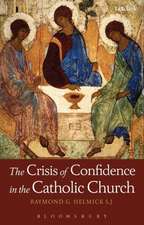Fealty and Fidelity: The Lazarists of Bourbon France, 1660-1736: Catholic Christendom, 1300-1700
Autor Seán Alexander Smithen Limba Engleză Hardback – 28 oct 2015
| Toate formatele și edițiile | Preț | Express |
|---|---|---|
| Paperback (1) | 436.14 lei 6-8 săpt. | |
| Taylor & Francis – 10 iun 2019 | 436.14 lei 6-8 săpt. | |
| Hardback (1) | 1005.01 lei 6-8 săpt. | |
| Taylor & Francis – 28 oct 2015 | 1005.01 lei 6-8 săpt. |
Din seria Catholic Christendom, 1300-1700
- 9%
 Preț: 1038.14 lei
Preț: 1038.14 lei - 15%
 Preț: 269.84 lei
Preț: 269.84 lei - 18%
 Preț: 1000.27 lei
Preț: 1000.27 lei -
 Preț: 388.13 lei
Preț: 388.13 lei -
 Preț: 416.22 lei
Preț: 416.22 lei - 28%
 Preț: 825.06 lei
Preț: 825.06 lei -
 Preț: 416.22 lei
Preț: 416.22 lei -
 Preț: 469.34 lei
Preț: 469.34 lei - 18%
 Preț: 1055.69 lei
Preț: 1055.69 lei - 18%
 Preț: 1054.71 lei
Preț: 1054.71 lei - 18%
 Preț: 1060.25 lei
Preț: 1060.25 lei - 18%
 Preț: 1008.17 lei
Preț: 1008.17 lei - 18%
 Preț: 1062.62 lei
Preț: 1062.62 lei -
 Preț: 436.14 lei
Preț: 436.14 lei - 18%
 Preț: 1063.41 lei
Preț: 1063.41 lei - 15%
 Preț: 259.31 lei
Preț: 259.31 lei - 31%
 Preț: 767.95 lei
Preț: 767.95 lei -
 Preț: 465.39 lei
Preț: 465.39 lei - 18%
 Preț: 1059.45 lei
Preț: 1059.45 lei - 16%
 Preț: 237.38 lei
Preț: 237.38 lei - 18%
 Preț: 1054.71 lei
Preț: 1054.71 lei - 18%
 Preț: 1060.74 lei
Preț: 1060.74 lei - 25%
 Preț: 769.92 lei
Preț: 769.92 lei -
 Preț: 436.14 lei
Preț: 436.14 lei - 18%
 Preț: 1054.71 lei
Preț: 1054.71 lei -
 Preț: 436.14 lei
Preț: 436.14 lei - 18%
 Preț: 1061.81 lei
Preț: 1061.81 lei - 28%
 Preț: 822.76 lei
Preț: 822.76 lei - 18%
 Preț: 1116.27 lei
Preț: 1116.27 lei - 18%
 Preț: 1056.14 lei
Preț: 1056.14 lei - 18%
 Preț: 1000.27 lei
Preț: 1000.27 lei - 18%
 Preț: 1109.18 lei
Preț: 1109.18 lei - 16%
 Preț: 299.52 lei
Preț: 299.52 lei - 16%
 Preț: 260.73 lei
Preț: 260.73 lei - 28%
 Preț: 821.53 lei
Preț: 821.53 lei - 18%
 Preț: 1005.01 lei
Preț: 1005.01 lei - 28%
 Preț: 820.71 lei
Preț: 820.71 lei - 18%
 Preț: 1008.86 lei
Preț: 1008.86 lei
Preț: 1005.01 lei
Preț vechi: 1225.61 lei
-18% Nou
Puncte Express: 1508
Preț estimativ în valută:
192.37€ • 209.03$ • 161.69£
192.37€ • 209.03$ • 161.69£
Carte tipărită la comandă
Livrare economică 21 aprilie-05 mai
Preluare comenzi: 021 569.72.76
Specificații
ISBN-13: 9781472444783
ISBN-10: 1472444787
Pagini: 240
Dimensiuni: 156 x 234 x 14 mm
Greutate: 0.59 kg
Ediția:Revised
Editura: Taylor & Francis
Colecția Routledge
Seria Catholic Christendom, 1300-1700
Locul publicării:Oxford, United Kingdom
ISBN-10: 1472444787
Pagini: 240
Dimensiuni: 156 x 234 x 14 mm
Greutate: 0.59 kg
Ediția:Revised
Editura: Taylor & Francis
Colecția Routledge
Seria Catholic Christendom, 1300-1700
Locul publicării:Oxford, United Kingdom
Cuprins
Introduction; In the footsteps of Monsieur Vincent: rhetoric and reality in the congregation of the mission; Fidelity and failure: the mission in Madagascar, 1648-1674; The call of the poor and the call of the prince: the Lazarists at court, 1672-1704; Masters and servants: the royal chaplaincies of the galleys, 1683-1703; Re-establishing Madagascar: piety and the ‘prince’s law’ in the Mascareignes, 1711-1736; Conclusion; Bibliography; Index.
Notă biografică
Seán A. Smith completed degrees at Trinity College Dublin and the National University of Ireland, Galway. His new book project, Succeeding the Jesuits, will examine the handover of former Jesuit patrimony in the eighteenth century. In 2014, he received a Postdoctoral Fellowship with DePaul University in Chicago.
Recenzii
"This volume engages a broad range of questions concerning the complex interaction of religious ideals and political and human realities in the era of Louis XIV and Louis XV. It merits a wide readership, including specialists in Jesuit history."
- Thomas Worcester, Journal of Jesuit Studies
"Although many books have been published about [Vincent de Paul's] life and his community’s significance as a dynamic force in Catholic-Reformation France, the history of the Congregation after his death is not often explored, and Smith’s book is a welcome addition."
- Susan E. Dinan, Catholic Historical Review
"This study makes an important contribution to our understanding of early modern religious organizations and their relationships with the absolutist state (as Smith points out, Vincent de Paul’s death corresponded almost exactly to the beginning of Louis XIV’s personal rule). The Lazarists have not received the same scholarly attention as groups like the Jesuits, even though their ideals and organizational structure were just as innovative and their influence as great."
- Linda Lierheimer, H-France Review
"It is a fascinating and highly readable account of the manner in which a religious community’s choices could become corrupted by closeness to power...Smith’s study is a valuable contribution to understanding the complex impact of absolutism on religious orders in early modern France."
- Carol Baxter, Renaissance Quarterly
"...the book is an excellent piece of historical scholarship, and will be much appreciated by scholars of religious history."
- Karen Carter, Church History
- Thomas Worcester, Journal of Jesuit Studies
"Although many books have been published about [Vincent de Paul's] life and his community’s significance as a dynamic force in Catholic-Reformation France, the history of the Congregation after his death is not often explored, and Smith’s book is a welcome addition."
- Susan E. Dinan, Catholic Historical Review
"This study makes an important contribution to our understanding of early modern religious organizations and their relationships with the absolutist state (as Smith points out, Vincent de Paul’s death corresponded almost exactly to the beginning of Louis XIV’s personal rule). The Lazarists have not received the same scholarly attention as groups like the Jesuits, even though their ideals and organizational structure were just as innovative and their influence as great."
- Linda Lierheimer, H-France Review
"It is a fascinating and highly readable account of the manner in which a religious community’s choices could become corrupted by closeness to power...Smith’s study is a valuable contribution to understanding the complex impact of absolutism on religious orders in early modern France."
- Carol Baxter, Renaissance Quarterly
"...the book is an excellent piece of historical scholarship, and will be much appreciated by scholars of religious history."
- Karen Carter, Church History
Descriere
The career of the French saint Vincent de Paul has attracted the attention of hundreds of authors, but the fate of his legacy remains vastly neglected. This book provides a thorough examination of the major activities of de Paul’s immediate followers, analyses the unique model of religious life designed by de Paul, and includes a study of the termination of the little-known Madagascar mission which revealed the terrible pressures on de Paul’s followers in the decade after his demise. The book also investigates the darker side of the Congregation’s novel alliance with Louis XIV, by examining its treatment of Huguenot prisoners at Marseille later in the century.











